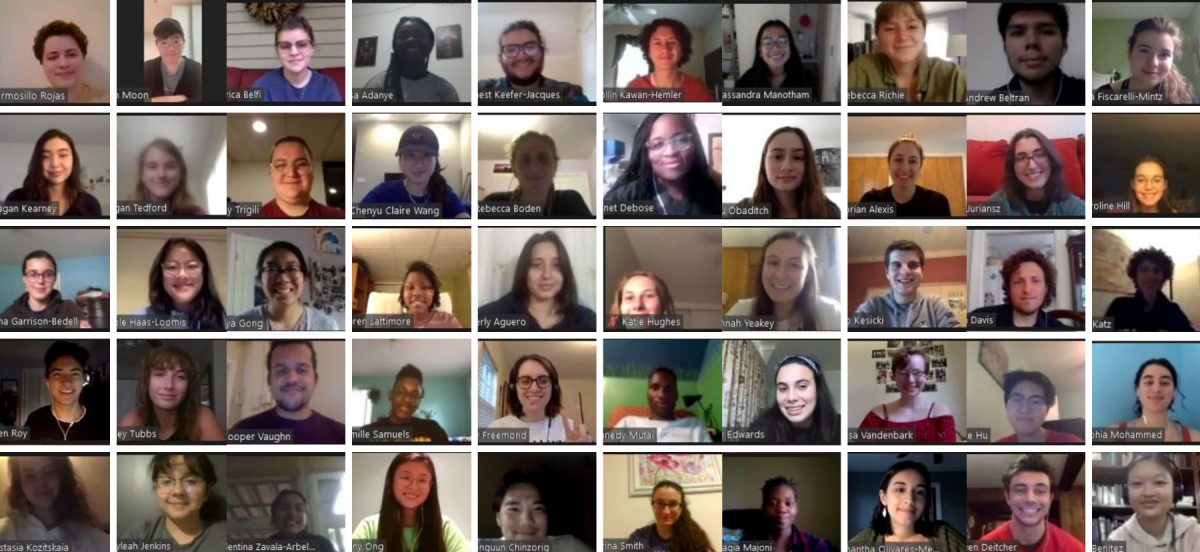CPGC Pivots Summer Internship Program to Remote Work During COVID-19

The 2020 CPGC Summer Fellows met virtually to begin a series of online module discussions called "Interdependence: Global Solidarity and Local Actions." (Not pictured: 10 of this summer's 60 interns.)
Details
This summer, during the global pandemic, the Center for Peace and Global Citizenship is continuing its mission of supporting student work that integrates academic learning with practical experience at social justice-focused organizations via remote internships.
Every year the Center for Peace and Global Citizenship (CPGC) supports and makes possible the work of Bi-Co students engaged in social justice work across the city of Philadelphia, the United States, and the world. This year, COVID-19 has made many parts of that—the travel, the in-person work—impossible. But the CPGC has worked tirelessly to make sure that the internship experience wasn’t another casualty of the coronavirus.
In early June, 60 Haverford and Bryn Mawr students began a re-imagined CPGC summer program that includes remote internships, online module learning, and a stipend. These students are interning at 15 of the Center’s on-going partner institutions and 28 new ones suggested by students who self-designed their internships. These partner organizations are based as close to campus as Ardmore and as far away as Mongolia. Their work to advance just, inclusive, and sustainable communities encompasses diverse issues such as food justice, educational equity, human rights, health care, and immigration.
“It took a tremendous amount of collaboration, creativity, and flexibility from the students, CPGC staff, higher-ed colleagues at other schools, and organizational partners to pull it together, and we are proud of what has come to fruition,” said CPGC Program Coordinator Julie Miller.
Though these internships won’t be exactly what the students imagined when they proposed or applied for them earlier this year, they will still offer valuable lessons in integrating academic learning with practical experience and will help the students to foster responsible engagement with social justice issues around the globe.
Anna Garrison-Bedell ’23 had been looking forward to traveling to Mexico City to intern at Casa Refugiados, an organization dedicated to providing victims of forced displacement with resources, for 10 weeks. Now she will help support the nonprofit’s mission of supporting people on the move from upstate New York.
“Instead of conducting in-person interviews assessing the kinds of resources that are required [of migrants], I will gather testimonies of people who have had positive experiences with the program online, and this will be supplemented by the learning modules provided by the CPGC,” she said.” I’m very much looking forward to helping Casa Refugiados with their mission of promoting empathy for victims of forced displacement, and I’m excited to learn from the people I will be working with, as well as hopefully forming a lasting relationship with their tightly knit community.”
Psychology major and Chinese language minor Ian Davis ’22 was eager to build on his experience teaching English-language learners during his summer internship with Mural Arts Philadelphia. When the coronavirus caused students to move to remote learning in the spring, he worried he would lose that opportunity and, with it, valuable career training. He is relieved, he says, that the Center was able to salvage its internship program, and though his work for the nation’s largest public art program will no longer include in-person instruction, his duties—developing teaching materials and assisting in ESL classes—will, thankfully, remain the same.
“Our remote format and the crisis at large has added some potentially insurmountable challenges—making classes accessible to students, finding times they can come, teaching an engaging class, fostering the interpersonal connections that undergird classrooms, overcoming the despair of isolation—but I am optimistic that I can make meaningful contributions to making English proficiency accessible through creating new programs, materials, and hopefully some productive Zoom sessions,” he said. “Remote introductions and relationships may not be what in-person relationships are but I am glad to have the opportunity to build new ones nonetheless.”
Garrison-Bedell and Davis both said they were grateful for the CPGC’s ability to reorganize their internship program because they are excited about their work opportunities, but also because they didn’t want the communities their host organizations serve to do without.
“Even if re-establishing plans set in a pre-pandemic time has been slow and, at times, arduous, I greatly appreciate the CPGC's commitment to not abandoning the students they pledged to support or the organizations we students had pledged to support,” said Davis.
Thanks to the support of generous alumni donors, the CPGC has not had to decrease the number of internships the Center offers this year, and, in fact, even took on new partner organizations this summer, including UNICEF. The UN agency responsible for providing humanitarian and developmental aid to children around the world is hosting six Bi-Co interns for the first time. Those students are part of UNICEF’s Youth Researcher Program, working on issues such as nutrition, health, food security, and education during emergencies.
While this summer will obviously not look like any other summer, the CPGC staff have been creative in their efforts to continue students’ applied ethical action. Even if it means that off-campus work will be done from the privacy of their bedrooms.
“Students and our contacts at nonprofit organizations displayed a lot of patience, perseverance, and flexibility,” said CPGC Associate Director Janice Lion. “I'm looking forward to what the summer learning will be. It won't be the same, but there are positives to that it will go beyond what's possible during a normal summer.”



